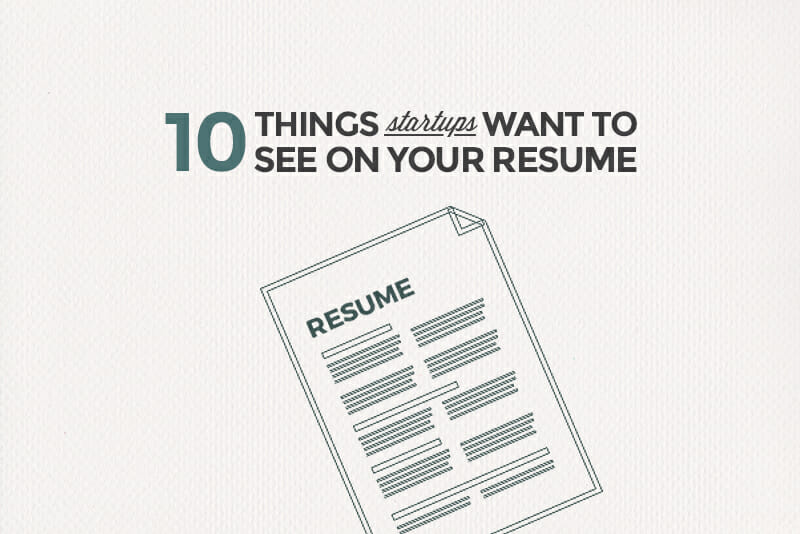22 Things to Remove from Your Resume Immediately
Do you want to get hired faster? Ditch these 22 things that are sabotaging your resume.


When I look back at the first couple resumes I sent, I immediately start cringing.
My first attempts at my resume were filled with flaws that I’m sure you can relate to. Not only were they way too long—the fact that I had page numbers should have been a red flag—but I also used teeny tiny font to make it seem shorter…and it wasn’t fooling anyone.
Now I know that my resume was so long because I left in piles of unnecessary additions that took up space and didn’t tell potential employers anything about the job I could do for them. Instead of focusing my resume on the job I wanted, I tried to do the impossible and paint a complete picture of myself in a single document.
Unsurprisingly, I got many rejection letters in the beginning of my career.
Whether you’re starting a brand new career like I was or you’re getting back on the job market, your resume can make or break your job search.
The big question, though, is what exactly you should do to turn your resume from an autobiography that no one finishes to a lean, efficient 1-pager that lands you interviews right and left.
For a comprehensive primer on writing a resume that gets you hired, download our free ebook, The Ultimate Guide to the Perfect Resume. You’ll get a step-by-step guide on exactly what to add and delete from your resume, how to format it to get the most traction from hiring managers, and tips for bringing your resume from the dark ages to the present.
But you don’t have to perform a complete 4-hour overhaul to turn your resume into hiring manager bait. Over time, I’ve found that getting your resume in tip-top shape doesn’t take as much effort as you’d think; it’s about knowing what to take out more than what to add.
Not sure what needs deleting? There’s good news: You can improve your resume 1000% just by removing these 22 small things:
(Don’t forget to snag The Ultimate Guide to the Perfect Resume here!)
1. Anything That Doesn’t Directly Relate to the Job You’re Applying For
When you’re updating your resume for a particular job listing, pay attention to what the responsibilities and necessary requirements are. If each bullet point on your resume can’t directly relate to something from that job posting, it’s best to leave it out.
And yep, this means you can’t just rely on one single go-to resume if you’re serious about getting hired fast. If you think about it, the single most important thing your resume should convey is that YOU are perfect for the job at hand. And one resume can’t make you perfect for every job on your wishlist!
Read more about that in The Ultimate Guide to the Perfect Resume, or check out this webinar we did with Course Report to find out exactly why you need to customize your resume for each type of job you apply for.
2. Jobs From More Than 5-10 Years Prior
Take out your random assortment of campus jobs from your college years or those couple of temp jobs you worked during your first year or two out of school. Chances are they have nothing to do with what you’re applying for.
And in case you held one single job for 5–10 years, a good rule of thumb is to limit yourself to including 4 previous work experiences.
3. Irrelevant Accomplishments or Awards
There’s no need to include that you won your county’s hoola hoop competition in the third grade, or that you were on the Dean’s List in college…unless those awards make you more qualified for the job at hand!
4. An Objective Line or Statement
Writing an objective statement at the top of your resume only swallows up precious resume space! Besides, you can write about yourself in your cover letter and/or application email.
5. Skills That Are a Given or Outdated
We’re over a decade and a half into the 21st century. You’re expected to know how to use Microsoft Word (and pretty much all of Microsoft Office), so there’s no point in writing it in your “skills” section.
Instead, if you’re applying to jobs in tech, focus on computer languages, programs, and apps you know that can truly set you apart in an applicant pool.
6. Images or Visuals
Unless you’re a designer doing a creative resume, steer clear of including photos, clipart, or graphs. They clutter up your resume, take up valuable space, and make it difficult to print out your resume (in the unlikely event that happens!)
Instead, spice up your resume by designing a clean logo and incorporating a muted color in headers on your resume.
7. Cliché or Vague Phrases
Calling yourself “results-driven” or a “team player” really doesn’t tell a potential employer much at this point. Save yourself the space and use specific examples to prove that you are these things.
For example, share information about a team you led and what you accomplished!
8. “References Upon Request”
There’s no need to add anything at the end of the resume that explains how references are available upon request. To a hiring manager, this is a given. And hey, deleting this line means more space for you!
9. Full Paragraphs
Steer clear of full paragraphs in your resume. Each previous role you list should have three or four bullet points (five or six tops if they’re super short!) explaining your position, your responsibilities, and your impact.
If there’s something you think is crucial for a potential employer to know, save that explanation for your cover letter!
10. Exaggerated Statements (or Straight-Up Lies!)
Keep in mind that hiring managers check up with your past employers and do their own research, so even if you think a small exaggeration will go unnoticed, trust me when I say it won’t.
For example, in the world of tech, never over-exaggerate how well you know a particular programming language. Saying you’re proficient in iOS development when you’ve dabbled in programming a single app won’t go over well. Hiring managers figure it out eventually, and it’ll only lead to embarrassment on your end.
11. Controversial or Bizarre Interests and Hobbies
Politics is a common problematic topic that comes to mind, but I would also refrain from mentioning in your resume that you can shotgun a beer in under 30 seconds. Unless you are certain that your politics line up with the company’s values, it’s best to steer clear.
12. Inappropriate Email Addresses
This sounds so obvious, but just last month a friend who was hiring received a resume with an email address that was something like [email protected]. Not kidding. Get a Gmail account and make it your first and last name.
13. Personal Social Media Accounts
Keep it professional! Even if you have the world’s cleanest social media presence, there’s no reason to give a potential employer any reason to start digging into your personal life. Including a LinkedIn profile makes sense in many cases, but there’s no need to add your Facebook account, YouTube channel, and Periscope handle.
14. Extra Pages
Resumes should be no more than one page max! This forces you to remove anything unnecessary and to be as straightforward and succinct as possible.
Worried you don’t have enough space to add something important? Keep in mind that if an employer really wants to know more, they can see it on your LinkedIn page, or you can mention that extra factoid in your cover letter or an interview round.
15. Anything That Resembles a Cover Letter
There’s a reason why resumes and cover letters are two separate parts of a job application: Resumes are meant to be an easy way to see someone’s work history and qualifications, while cover letters allow you to show your personality and address things that someone wouldn’t know from looking at your resume.
16. Broken Links
If you’re linking to a portfolio or website (and you absolutely should), it’s especially important to make sure that all of your links work and that you typed them out correctly on your resume.
17. Kooky Fonts, Colors, or Clipart
No, your resume should not mimic the pink and scented one that Legally Blonde’s Elle Woods handed in at Harvard Law School. (I know, it’s a bummer.)
Also, no Comic Sans, please! Arial, Times New Roman, and similar legible and professional fonts are the way to go. And don’t make your text size any smaller than a 10-point font at the very most.
18. Anything School-Related
Unless you’re a year or two out, take out mentions of your college GPA, graduation year, or that random fiction writing prize you won during your freshman year. They can make you seem more junior than you are, and besides, most of those accomplishments won’t affect your job performance.
19. Big Words or Industry Jargon
A Princeton University study found that people who used huge words in their writing were thought to be overcompensating and therefore untrustworthy by colleagues. A resume should be straightforward, so be as simple as possible with language.
Additionally, steer clear of industry jargon unless it’s absolutely necessary. A hiring manager might not know as much as you, or on the flip side, they might know way more than you and may catch you misusing industry words!
20. Acronyms
The tech industry in particular seems to have acronyms for everything, but when it comes to a resume, steer clear of shortening any words or phrases to avoid confusion or misunderstanding about your skills and background.
21. A Bio
Scrap the bio from your resume and make sure the one on your LinkedIn page is top-notch instead!
22. Typos
This sounds like a given but it happens all the time! Two important pro tips: First, read your resume out loud; it’ll help you see more typos. Second, read it backwards starting with your last sentence and working your way up the page. You’d be surprised how many grammatical and usage errors I’ve found doing this.
Got through this list of 22 things to remove from your resume? You’re well on your way to impressing a hiring manager and landing that job!




